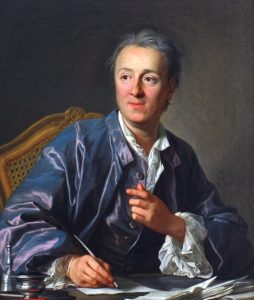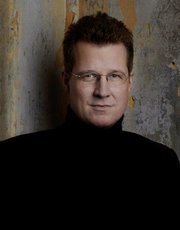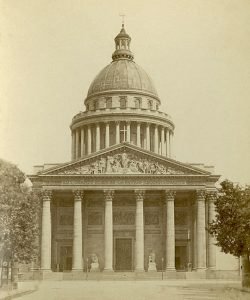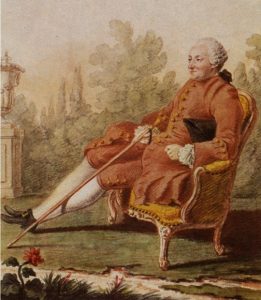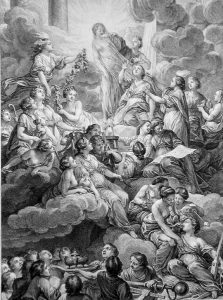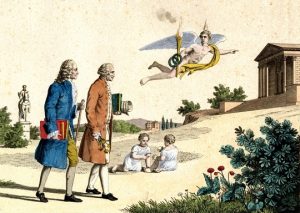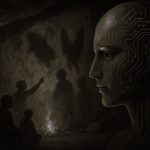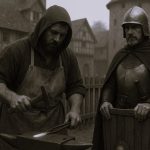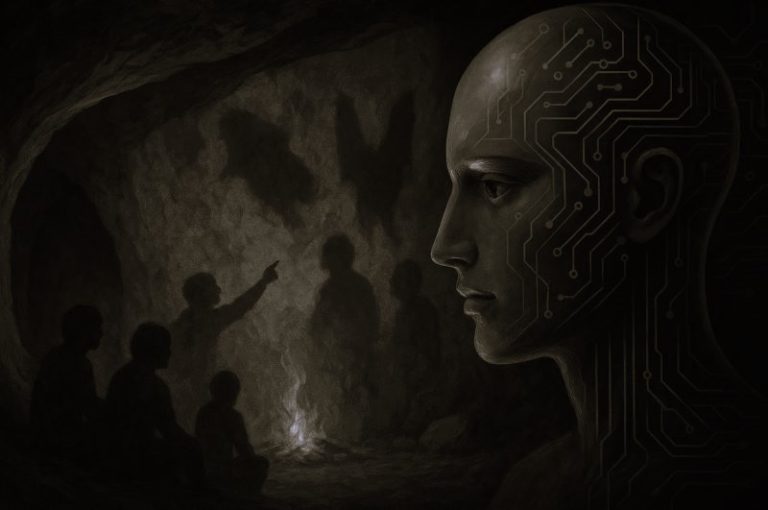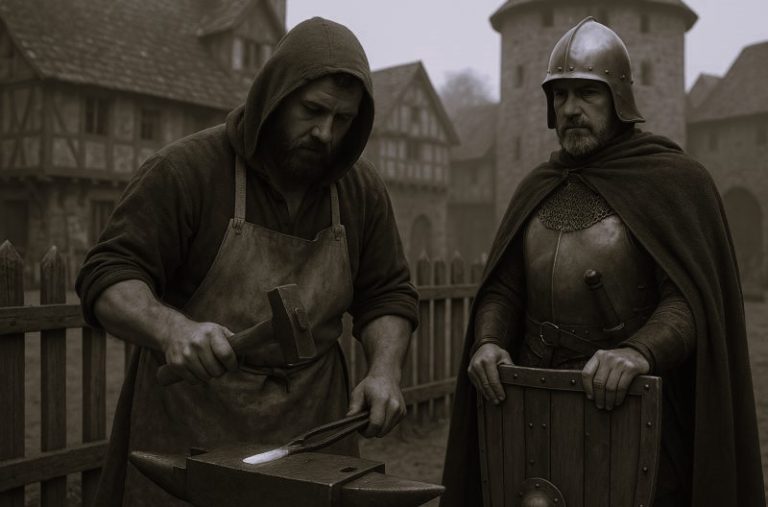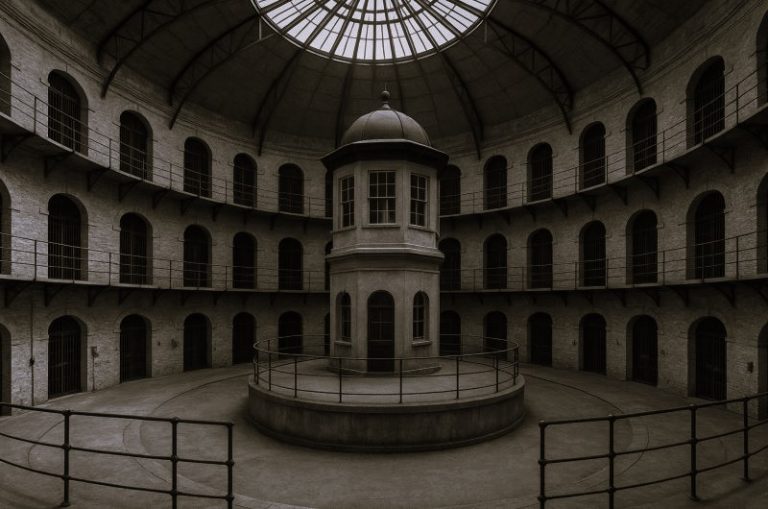Louis-Michel van Loo’s portrait of Denis Diderot painted in 1767 / Wikimedia Commons
October marked 300 years since the birth of French Enlightenment thinker Denis Diderot. Although perhaps best known for co-founding the Encylopédie, Philipp Blom argues for the importance of Diderot’s philosophical writings and how they offer a pertinent alternative to the Enlightenment cult of reason spearheaded by his better remembered contemporaries Voltaire and Rousseau.
By Dr. Philipp Blom
Historian
It was about time. Three hundred years after his birth Denis Diderot is in line for receiving the highest honour France has to bestow on one of her own. President Francois Hollande announced his intention to have the encyclopedist’s remains transferred to the Panthéon in Paris or, as the French language so deliciously puts it, to have him pantheonisé.
The Panthéon is sacred ground in Paris—not because it was built as a place to worship the Almighty, but because the French Revolutionaries turned it into a site for the burial and commemoration of, as the façade proclaims, the grands hommes of the nation. Rising high above the Quartier Latin and illuminated at night by fiery orange lights, the building with its imposing cupola stands also as the memory of the French republic, cast in stone.
The building was constructed originally as the church of Saint Geneviève after Louis XV had sworn to honor the saint should he recover from a grave illness. Because of the exorbitant costs of financing the monarch’s will and whim, construction was finished only in 1791. Meanwhile, the Revolution swept over the country. The church was designated a mausoleum for the nation’s great men, the first of which, the count of Mirabeau, was admitted in 1791, only to be excluded three years later, when political allegiances had changed. History also is subject to changing administrations.
Since then the Panthéon has been the theatre of many ideological battles, the center of consecration of the French sense of self and its many permutations. Félix Éboué, a member of the colonial administration, became the first black Frenchman to enter into the hallowed ground, in 1949; the first woman, Marie Curie, in 1995. The tomb listing reads like the greatest hits of French intellectual history—Alexandre Dumas, Victor Hugo, André Maulraux, Émile Zola. The most famous philosophers interred in the crypt are two stars of Enlightenment thought: Voltaire and Jean-Jacques Rousseau, who were thus honored already during the eighteenth century—despite the fact that the former spent his adult life in exile and the latter was not even French. Tourists often pose for photographs in front of their sarcophagi.
Photograph showing the view of the entrance to the Panthéon in Paris, circa 1880 / Wikimedia Commons
Now it may be Diderot’s turn to receive this secular consecration. This proposed honour that would not only have delighted the passionate unbeliever Diderot who thought of posterity of ‘heaven for atheists’. It is also richly deserved. Diderot, after all, was not only editor of the great Encyclopédie and of several highly influential novels, philosophical works, plays and hundreds of amusing letters, he was also the star of the philosophical salon of Baron Thierry d’Holbach – himself a prolific author – which in its heyday arguably became the intellectual epicenter of Europe.
But things aren’t quite as easy. First of all, Diderot has been denied this honour multiple times, most recently in 1913. He was, still is, thought of as an intellectual troublemaker, someone all too fond of Eros and erotic passion, an implacable enemy of the Church, an incorrigible skeptic when it comes to power and the right of individuals to decide over others. These difficulties could perhaps be overcome in our tolerant and republican age. After all Voltaire, who has preceded him in the sacred site of French national memory, was also not a friend of the Church.
Another difficulty may prove even more intractable, and more indicative of Diderot’s difficult posthumous life. Strictly speaking, we know where Diderot’s bones are. They are in the ossuary of the église Saint-Roch on the rue Saint-Honoré in Paris, directly under the altar, just a mile or so away from their destined final resting place. Holbach, incidentally, is there too, as are a number of other notable Frenchmen. The problem is that we may know where they are, but not which of the bones down there belonged to the philosopher.
During the French revolution the ossuary was vandalized by over-zealous revolutionaries, and the tragic episode of the Paris Commune in 1871 saw a repetition of this posthumous violence. At present the ossuary is closed and it is difficult to know in which state it really is, but it would hardly be appropriate for the body of a convinced materialist if the bones on the sarcophagus bearing his name would in fact be a composite skeleton made up of various denizens of his former place of burial. Perhaps a DNA analysis would solve this problem, but it would hardly be a straight forward task.
In their own day Diderot and his philosophical brothers in arms were revered and reviled in equal measure, much visited and written about. D’Holbach’s famous salon could assemble on a single evening luminaries such as Diderot, David Hume, the economist and anti-colonialist Guillaume Raynal, the novelist Lawrence Sterne, Edward Gibbon, Cesare Beccaria, the Italian legal reformer and opponent of the death penalty. The salon was not a philosophical school with rigid teachings but an ongoing conversation between scientists and poets, atheists and believers, philosophers and practitioners. Called “the personal enemy of God”, d’Holbach invited priests and other critics to his table and even kept a chaplain at his summer house, to say mass for his conventionally minded mother in law.
Portrait of Baron d’Holbach painted by Louis Carmontelle in 1766 / Wikimedia Commons
The radical Enlighteners were well connected but more importantly, their frighteningly uncompromising writings were read and discussed throughout the Western world; The System of Nature, d’Holbach’s materialist masterwork was on the Catholic Index and had to be printed and distributed in secret. It still sold more than a hundred thousand copies during the second half of the eighteenth century.
Condemned by the Church and hated by the Court, d’Holbach and Diderot were beacons of free thinking and directly inspired the America’s Founding Fathers. Franklin is likely to have participated at the dinners and ensuing discussions; Jefferson, whose personal library still testifies to his interests, read and admired Diderot, d’Holbach, Helvétius, and Raynal, as well as their intellectual predecessors. For the Declaration of Independence, he transformed the Lockean formulation for the pursuit of life, health, liberty, and property into the more properly Epicurean and Diderotean “pursuit of Happiness.”
And yet the radical enlighteners have been pushed into the margins of memory and the footnotes of the history of thought. The Enlightenment is, in our common school understanding at least, the history of a cult of reason whose high priests were Immanuel Kant and Voltaire, not the huge intellectual revolution of Diderot and his friends. Their relative obscurity is not an unsolvable mystery if one compares their thinking to that of Voltaire and Rousseau, who criticized absolutist excess but not the authoritarian rule of the few over the many; they attacked the Church but sung the praises of the “highest being”; their views were solidly deist and authoritarian and lent themselves to justifying the power of a new, post-Revolutionary politics. Robespierre made Rousseau the patron saint of the new state, heaped him with praise and had a bust of him carved from a stone taken from the Bastille.
D’Holbach and Diderot had a very different vision of human nature. Enthusiastic followers of their century’s tidal wave of new scientific discoveries, they concluded that nature was evolved, not created; that it was all material and had no place for immortal souls; that it consisted of nothing but matter and that we are animals within it, a universe empty of sense and without God. In the oppressively clerical environment of their day this last point took a good deal of their attention. In sharp polemics they attacked Christianity and religious faith in general, arguing that it was nothing but a primitive fiction designed to keep the poor in their place, a conspiracy of magistrates and priests.
Diderot saw the truest and the highest goal of human nature not in reason, but in lust. Humanity’s existence is driven by Eros, by the search for pleasure. This sensualist approach had an important metaphysical consequence: in a world without sin, a world in which no wrathful God has condemned all lust and demands suffering from his creatures on this earth in order to soften the blow of eternal punishment, the goal of life becomes the best possible realization of pleasure, the education of desire in accordance with natural laws. In a society without transcendental interference, this chance, the chance of the pursuit of happiness, must be given to all.
Detail from the frontispiece of the Encyclopédie (1772) drawn by Charles-Nicolas Cochin and engraved by Bonaventure-Louis Prévost. The work is laden with symbolism, the figure in the centre representing truth, surrounded by bright light (the central symbol of the Enlightenment). Two other figures on the right, reason and philosophy, are tearing the veil from truth. / Wikimedia Commons
These views were anathema to just about everyone who sought to maintain or gain power, from the aristocracy to Revolutionary dictators such as Maximilien de Robespierre and Napoleon, all the way up to the Catholic Restoration that followed. “Men will not be free until the last king is strangled with the guts of the last priest,” wrote Diderot—not the kind of message to appeal to the nineteenth-century bourgeoisie. Laissez-faire capitalism allowed a self-proclaimed Christian middle class to profit from the misery of the working poor, at home and in the colonies. They could not argue for their position with Diderot, who became ever more scathing about the justification of power, privilege, slavery, and colonial expansion. It was Voltaire’s moderate Enlightenment that offered them the necessary vocabulary and allowed them to see themselves as the guardians of civilization, Enlightenment and religious values, put above the ignorant masses by divine providence.
The radical Enlighteners had understood and condemned this emergent power structure, as a ‘conspiracy of priests and magistrates’. Their thought was evolutionist long before Charles Darwin; they defended the rights of slaves before William Wilberforce and of women before Mary Wollstonecraft. They wanted to see individual fulfillment in a morality built around lust and social justice in a society built on pleasure and free choice, not on pain and oppression. Their potent ideas were unsurprisingly intoxicating discoveries for latter-day revolutionaries; among d’Holbach and Diderot’s ardent readers were Karl Marx, Friedrich Nietzsche, and Sigmund Freud.
Censorship, condemnations, and the threat of arrest had been a fact of life for Diderot, but he could not anticipate the cruel or unusual punishment that they might suffer after their deaths. The twisting of facts and relationships began as Voltaire and Rousseau were ceremonially laid to rest in the Panthéon and eulogized as the noblest minds of humanity. Forgotten were Voltaire’s political cabals, his role as creditor to the very potentates he apparently attacked, his highly ambivalent stance to the aristocrats who kept him rich and famous and his cynical stance to religion as opium for the masses. Forgotten were Rousseau’s tantrums and his betrayal of friends, his advocacy of dictatorship. Two sarcophagi and countless busts and embossed books broadcast their grandeur and unimpeachable probity.
Voltaire and Rousseau taking a walk toward their immortalisation in the French canon, in a drawing entitled “Aux Grands Hommes la Patrie Reconnaissante” (To the Great Men, the Grateful Homeland), the same words inscribed above the entrance to the Panthéon necropolis where the two men are buried / Musée Jean-Jacques Rousseau
At the same time Diderot and d’Holbach have been denounced as immoral, ridiculed as talentless, kept out of some school syllabi; their bones moldered in an anonymous heap, their books were printed only sporadically and in small editions. When spoken of, Diderot was softened into an eccentrically Gallic novelist and editor of a long-outdated encyclopedia and d’Holbach was relegated to the status of a dim and boring precursor of Marxist theory. The salon and its guests were quickly forgotten: the Parisian house where for twenty-five years Europe’s most brilliant minds—‘Sheiks of the Rue Royale’ Hume called them—met and debated still bears no plaque or visible recognition of any kind.
The grand narrative of a rationalist Enlightenment that freed humanity from superstition only to subjugate it once again, this time to the dictates of reason and rationalization, suited the interests and self-image of an economy driven by entrepreneurship and fuelled by a cult of efficiency and cheap labor. Our own time dominated by the fiction of the market that needs to be obeyed and placated like an ancient deity and a society optimized for maximum consumption are a direct consequence of the Enlightenment cult of reason without the Diderotian emphasis on empathy. We have inherited the truncated history and repeated it to one another, tacitly encouraging a narrowness of thought that bears little resemblance to one of the freewheeling exchanges over candlelight at d’Holbach’s salon. The existence of a second, more radical Enlightenment tradition is not denied completely, but two centuries of historical bias have done their work, slowly but surely.
This will not change if Diderot’s bones, or some of them, really make it to their new and honorific final resting place. There is already a memorial dedicated to him in the Panthéon – as the editor of the Encyclopédie, the image he got stuck with as his philosophical work was marginalized and finally all but forgotten.
But while his role in this magnificent mammoth work was important for the eighteenth century, it is Diderot the philosopher who can still speak to us today. His advocacy of a passionate life, of social solidarity and empathy as the foundations of morality, his interest in science as the basis of all knowledge and in art as and Eros as ways of creating meaning have lost nothing of their freshness, or their necessity. The real potential of the Enlightenment, he says time and again, is not the absolute rule of reason, but the rehabilitation of passion as the basis of a life well lived.

